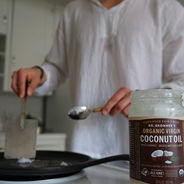The Pill: A Woman's Potion or Poison?
- Christian Van Camp

- Jan 24, 2020
- 7 min read
Updated: Feb 4, 2020

Hormones. Everyone seems to talk about these things left and right, but most of us truly don’t realize their innate complexity and remarkable powers.
Elevated levels of one hormone may be a sign of vibrant health; whilst high amounts of another type of hormone can cause emotional turmoil.
The ever-changing levels throughout the day mold each of your thoughts, words, actions, and feelings. This is especially accurate after swallowing that teeny tiny baby-preventing pill.
Hormonal birth control does not resolve the problems related to cycles that they claim to. The pharmaceutical companies synthesizing these man-made hormones thrive on genius marketing schemes. Big pharma attempts to convince people like you that “they're a necessity to women’s wellness.”
But it‘s not the only effective method of avoiding pregnancy. There are a collection of other alternatives to birth control that not only focus on the underlying issues, but are healthier, safer, and just as effective at working with your unique concerns.
Alright alright, you’re probably thinking… “Who does this dude think he is stepping into a woman’s subject and situation here?”
It’s a fair argument, but don’t get it twisted.
THANK GOD I have grown up side-by-side with three diversely-aged amazing sisters, Nena, Ellie, and Courtney. I happen to be the middle child and the only brother (that’s why I’m so good with the ladies nowadays).
My point is this: Now that I’m a wee-bit more mature, I openly talk to them about their personal experiences with these body- and mind-altering drugs. I have witnessed their negative attributes to these poisons (not potions) first-hand.
Birth control has a nasty potential and they aren’t the only route for preventing preg. Later on you’ll read about the healthier alternatives.
I send out love and compassion to every woman on the face of this planet (Yeah I’m a suck-up). But in all honesty I want to help improve their livelihoods in any way possible.
That's why I'm writing this blog.
To get things straight, you cannot question the right for women to have a choice for hormonal birth control.
They simply need to know if they opt in, there will no doubt be significant impacts on their life long-term.
Let’s discuss what exactly hormones are and their importance before diving into birth control’s impact on them.
Hormones tell your body and brain how to grow, breathe, think, and feel. Hormones are molecules produced by the endocrine system otherwise known as chemical messengers that communicate critical information to specific parts of the body. I think of them as microscopic mailmen going door to door dropping off notifications on how to act in your life. They tell each one of your distinct cells what to do.
Hormones and cells have a specific lock-and-key love life. Hormones can’t just bind to anyone; they have a tight-knit friendship with these certain cells. After secretion, whether it's insulin from the pancreas or cortisol from your adrenals, they somehow know the exact mapping to a designated site. They have one mission at a time, and once let loose by a gland in the endocrine system, they’re on the move to enact some physiological change in your body.
For instance, they’re in charge of hunger, blood pressure, and sexual desire. They also play a massive role in your reproductive capacity.
Here is a simplified list of the major endocrine glands and organs that produce a vast array of hormones every second of the day:
- Hypothalamus: regulates body temperature, hunger, mood, thirst, sleep and libido
- Pituitary: Known as the “Master Gland” by controlling other glands behind the scenes through a variety of hormone secretions
- Parathyroid: regulates calcium
- Pancreas: produces insulin to bring blood sugar down and help use food as energy
- Thyroid: regulates heartbeat and how calories are used (controls metabolic rate)
- Adrenal Glands: produce stress hormones, such as cortisol and norepinephrine
- Pineal Gland: produces melatonin to regulate your sleep and wake cycle
- Testes: produces testosterone and sperm
- Ovaries: secrete sex hormones for use in the reproductive cycle (progesterone, estrogen, androgens)
These strange and stunning pieces of data are fundamental to all the systems in your body, so when altered unnaturally by certain contraceptives, you may experience severe (or subtle) differences in your behavior, energy, mood, and thoughts.
If you have a healthy menstrual cycle, your reproductive hormones naturally bounce up and down throughout your cycle—it’s a constant flux of feelings.
But all of this can change if you decide to pop certain types of hormonal birth control (and potentially cause more harm in the long-run than you intended).
According to a Time article written in late 2018, “Almost 13% of women said they used birth control pills, followed by about 10% who used long-acting reversible contraceptives (LARCs) such as intrauterine devices (IUDs). Almost 9% of women used the male condom for birth control, and almost 6% relied on a male partner's sterilization, which is performed through a vasectomy. Smaller proportions of women used methods including rings, patches, diaphragms and injections.”
Most women are taking advantage of modern medicine to patch-up and prevent pregnancy.
Totally understandable.
Despite the wealth of knowledge available via Google, books, and podcasts, the science of fertility remains a mystery to most girls and even grown women.
Teenagers in this day and age are not taught enough in-depth sexual health in the classroom. For some odd reason, it’s considered a difficult topic of discussion, even though we all know where babies come from… let’s be honest.
But this is going down a different trail. Let‘s continue:
Many of these young women are unaware of the consequences anointed with that daily pill-poppin’. They are blindly told by physicians, the medical industry, and uninformed friends that this is the most suitable option.
Unfortunately, mainstream publicity promotes birth control medications as the simplest and cheapest alternative to annoying condoms or IUDs.
Sure, everyone wants to have a really good time in bed—but for the most part—there comes a cost. A gargantuan cost.
According to a recent NCBI medical article, “The birth control pill is the most commonly prescribed form of contraception in the US. Approximately 25% of women aged 15-44 who currently use contraception reported using the pill as their method of choice.”
Why is it that this is the most desired method of choice?
Because we are blinded by the consequences spewed out by the media and medical industry. We think a pill can prevent that unwanted ill, but there’s much more to this equation. The article continues:
“The most commonly prescribed pill is the combined hormonal pill with estrogen and progesterone. Progesterone is the hormone that prevents pregnancy, and the estrogen component will control menstrual bleeding…
Progesterone negative feedback works at the hypothalamus to decrease the pulse frequency of gonadotropin releasing hormone. This, in turn, will decrease the secretion of follicle- stimulating hormone (FSH) and decreases the secretion of luteinizing hormone (LH).”
“Estrogen has some effect with inhibiting follicular development because of its negative feedback on the anterior pituitary with slows FSH secretion; it’s just not as prominent as the progesterone’s effect. Another primary mechanism of action is progesterone’s ability to inhibit sperm from penetrating through the cervix and upper genital tract by making the cervical mucous unfriendly.”
Now what is my point with all this science-heavy jargon?
These two hormonal pills have a profound effect on the entire woman’s body, because as stated earlier, these strange and stunning pieces of data are fundamental to all the systems in your body, so when altered unnaturally by certain contraceptives, you may experience severe (or subtle) differences in your behavior, energy, mood, and thoughts.
For example, when you alter the levels of secreted estrogen or progesterone, there is more than a single effect on your cycle and resistance to getting pregnant.
Actually— there is a plethora of physiological mechanisms and reactions affecting the totality of your brain and body.
After ingesting that pill, there are enough hormones secreted by the hypothalamus and pituitary to shut down the communication to your ovaries and you deplete secretion of FSH and LH; therefore, you don’t ovulate.
This is the goal if you don’t want a child… but if you open your eyes, those aren't the only unnatural things occuring in your body… and brain.
We need to begin to understand that these hormonal releases all start in the noggin which transmits major repercussions throughout the body.
That’s why women experience such disturbing side effects from hormonal contraceptives, such as:
- Mood Alterations (i.e. increase in rates of depression)
- Vaginal Dryness
- Nausea
- Hair Loss
- Breast Pain/Tenderness
- Skin Issues (i.e. dryness)
- Low Libido
- Fatigue
- Weight Gain
- Headaches
- Blurred Vision
- Chronic Infections
As well as a significant increased risk for:
- Autoimmune Disease
- Heart Attack & Stroke
- Thyroid & Adrenal Disorders
- Breast & Cervical Cancer
Besides the physical and mental well-being costs of these hormonal modulators, the clear-cut chart below (from The Center for American Progress) depicts women’s out-of-pocket financial costs to the top 7 used contraceptives:

Devastatingly, these birth control regulations do more than just steal women’s wallets. They threaten women’s basic rights over their own bodies (especially with the promoted use of hormonal contraceptives vs. IUDs, or other healthy modalities).
However, with all of these backlashes on their personal reproductive choices, women are finally choosing to speak out. I appreciate these women like CRAZY, don’t get me wrong.
But a lot of these strong-willed girls are fighting for a cause that doesn’t necessarily directly benefit their health. Their autonomy and rights must be recognized.
Yet their lasting intention doesn’t seem to be veering in quite the right direction.
Many are fighting for coverage through hormonal oral contraceptives, even though they should truly be fighting for other alternatives that are far more healthy and effective against potential pregnancy, such as IUDs.
With this statistic in mind, here is a list of the top alternatives to these hormone-disrupting oral contraceptives:
- Intrauterine Device (IUDs)
- Diaphragm
- Cervical Cap
- Male & Female Condoms
Hey, don’t get me wrong... I enjoy it natural and free-flowing as much as the next guy (and gal), but taking advantage of the rubber or an IUD to prevent a potential pregnancy might have to be the move. It exceeds the dark consequences hidden inside that life-altering pill.
As you can see, there are many contraindications of contraceptives. The only thing you should do for better health and wellness is to do the research yourself and figure out what clicks with your unique body and mind. Everybody and every body is a snowflake.
Some individuals may experience a flip in livelihood from some random modality compared to the next person.
Keep that in mind when arguing with someone about anything in the health and wellness realm. As you march on through your glorious day and encounter new faces, remember that we are all extraordinarily incomparable and unique biological bipeds—but simultaneously—we are all one.
I highly recommend you take a listen to Ben Greenfield’s podcast with Dr. Jolene Brighten, a functional medicine, naturopathic doctor, who was a 10-year pill-user herself: https://bengreenfieldfitness.com/transcripts/transcript-natural-birth-control/
They literally talk about EVERYTHING you need to know regarding contraceptive use as well as how to get off safely and effectively. Give it a listen for some more knowledge bombs!
Here’s a link to her eye-opening book, Beyond the Pill: A 30-Day Program to Balance Your Hormones, Reclaim Your Body, and Reverse the Dangerous Side Effects of the Birth Control Pill:

































コメント